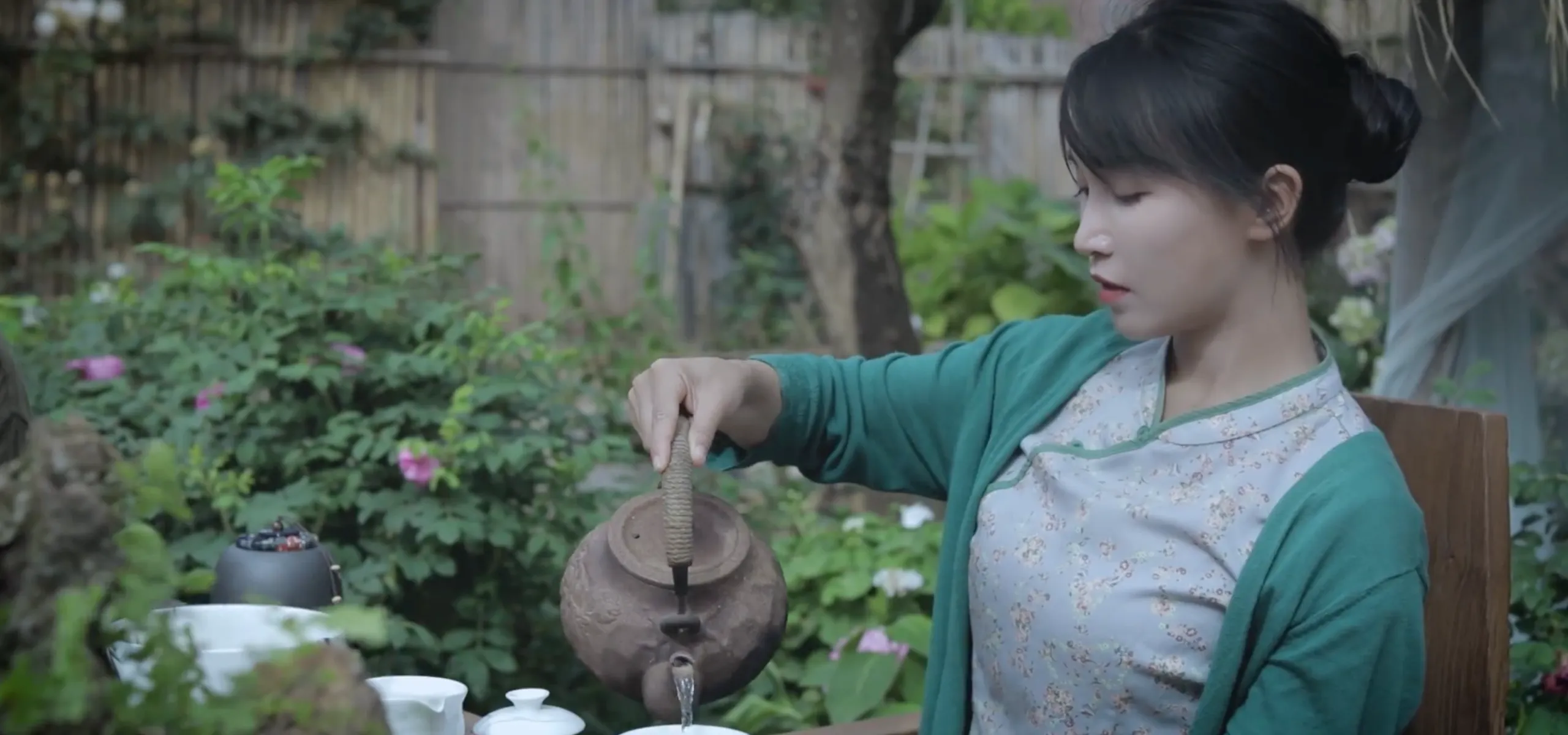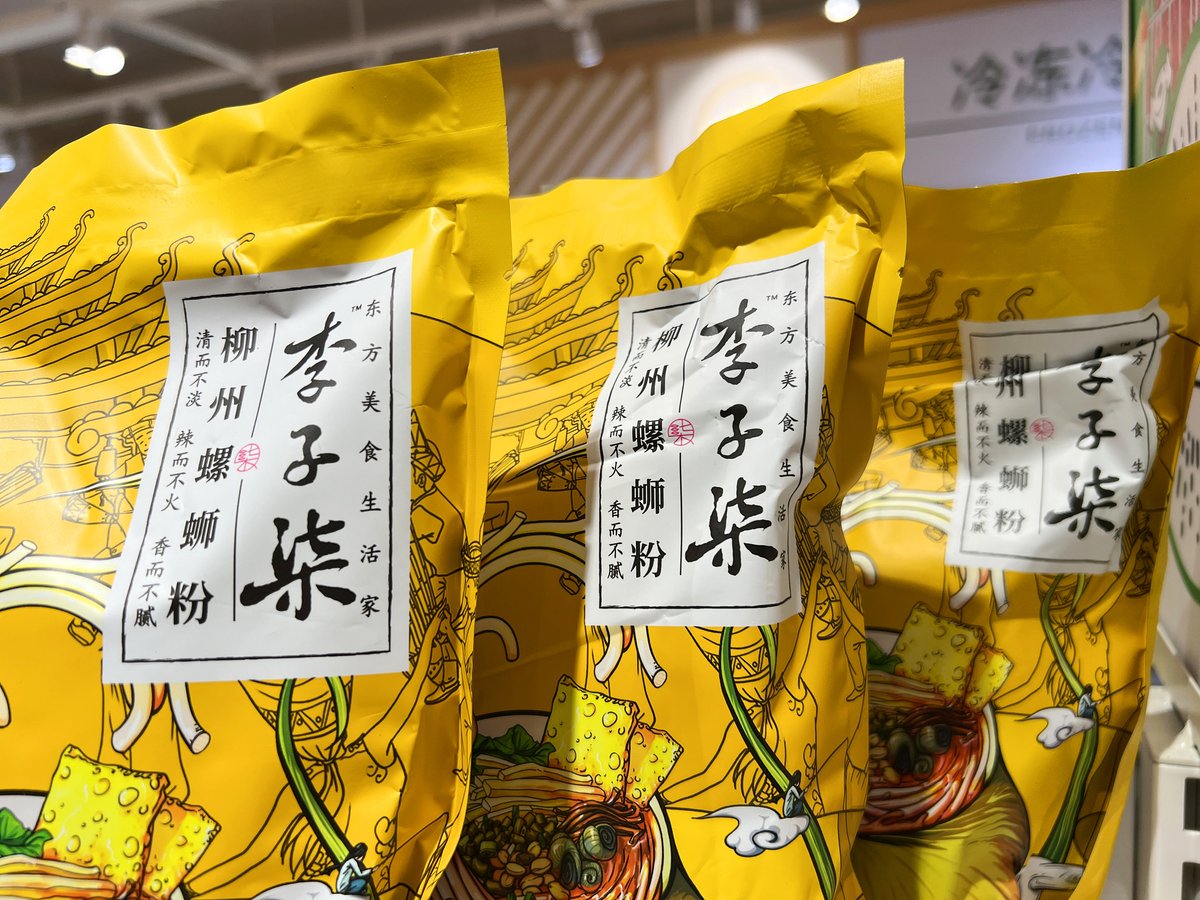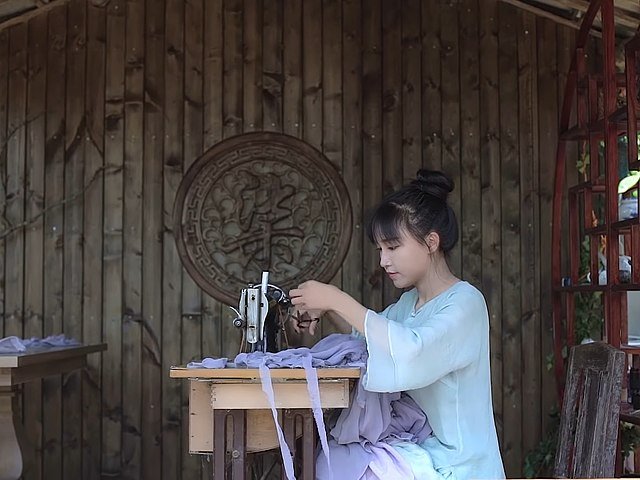Li Ziqi, one of China’s most popular vloggers, has fallen out with her management company—what does that mean for the industry?
Since this summer, world-renowned vlogger Li Ziqi has garnered even more media attention than normal: not because of her idealized videos of rural life, which have been viewed billions of times online, but due to her lack of updates since she released her last video on July 14 this year, along with some confusing and out-of-character remarks on social media.
“Disgusted at midnight,” Li wrote on her account on social media platform Oasis, which is affiliated to Weibo, on August 29, later commenting under the post, “I already asked a lawyer to keep records; it’s horrible! Capital really knows how to play a good game.”
The next day, she followed up with, “Reporting to the police in the early morning” with a photo of herself at the police station.
Li’s 100 million online followers on Douyin, Weibo, and YouTube (where she is the platform’s most popular Chinese-language account) have been feverishly speculating about what’s going on with the wildly successful vlogger. The 31-year-old former high school dropout has built a brand allegedly worth billions of RMB with videos of herself preparing food and handicrafts using traditional Chinese techniques in her home village in Mianyang, Sichuan province, and from selling products on her online shops.
Who gets to keep the lion’s share of these massive revenues appears to be at the heart of Li comments. She is now in legal dispute with her management company, a multi-channel network (MCN) called Weinian. On October 25, Sichuan Ziqi Culture Company, a joint venture of Weinian and Li registered under Li’s legal name Li Jiajia, filed a lawsuit on behalf of Li against Weinian and its founder Liu Tongming.
Li appears to want to separate herself from Weinian, the company she has worked with since 2016 and which has a controlling stake of 51 percent in Li’s company and brand, potentially giving them ownership of her intellectual property.
The controversy has thrown a spotlight on the murky workings behind China’s gigantic livestreaming, short video, and internet celebrity industry, and the conflict between the stars on screen and the MCNs that sign, market, and manage them.
MCNs originated in the US in early 2010s to work with YouTubers. Like traditional celebrity management companies, MCNs promise to help grow influencers’ fanbases and monetize their popularity in exchange for a cut of the revenues and other benefits, like shares of merchandise sales and rights to intellectual property.
MCNs like Weinian have grown rapidly in China in recent years along with the development of social media, especially video-sharing platforms. According to a report by iiMedia Research, a third-party data mining and analysis organization, from February of last year, the number of MCNs in China rose from around 150 in 2015 to 5,800 in 2018, and was expected to exceed 28,000 in 2020. As of 2019, the industry was valued at a total of 16.8 billion RMB.
“More than 90 percent of online influencers have signed or will eventually sign with management companies,” Cui Jianying, former manager of an MCN in Jinan, Shandong province, estimates to TWOC.
“In the current online environment, few individuals can grow popular on their own; the majority of online superstars have companies behind them,” Cui points out, claiming that a star’s rise often begins with traffic or fans “purchased” for them by MCNs.
MCNs sells themselves to clients by promising to drive up the traffic of their content. For example, one service provider cited by the state-run Xinhua News Agency apparently offered packages starting from 28 RMB for 20,000 views, 150 likes, and 15 comments, “50 RMB for five people to interact with viewers for an hour,” and “40 RMB for 10 bots to interact with viewers for three hours.”
The company describes itself as a “click farm” and, like several other MCNs Xinhua surveyed, claims to have a wall of phones synchronized together in their offices so that one employee can manage hundreds of online accounts.
While Li’s fans believe her quality content to be the foundation of her popularity, her cooperation with Weinian appears to have added impetus to her rise. Li had accumulated around 400,000 fans on video-sharing app Meipai in early 2016, but in November that year, just two months after signing a contract with Weinian, a video of Li handmaking Lanzhou stretched noodles went viral, earning over 50 million views and 600,000 likes on Weibo. By the end of that month, her number of fans on Weibo surged to over 300,000, from less than 10,000 earlier that year.
Meanwhile, the shop Weinian established in Li Ziqi’s name on e-commerce platform Tmall in August 2018 sold over 150,000 RMB of “snail rice-flour” noodles and four other food products adorned with Li Ziqi branding within the first six days. Its total sales volume in 2020 reached 1.6 billion RMB, according to a report by research institute Haitunzhiku this February. The shop is wholly owned by Weinian, and what cut of those extraordinary sales figures end up in Li’s hands is unknown.
The terms of contracts between MCNs and their clients can vary significantly: According to Cui, the proportion of the earnings online influencers end up with ranges from 10 to 80 percent of revenues, based on their contribution to the content, their negotiation ability, and their awareness of their own value. As many content creators sign up when they are less well-known, they may be at risk of signing over too much to MCNs that promise to make them a star.
Despite her millions of followers, Li may be in a “worse situation than everybody imagined” according to “Tusiji Laodaye,” an internet industry blogger on Weibo with 1.6 million followers, because Weinan has a controlling share in businesses connected to Li and has rights to the IP created.
According to the public business registration records, Weinian owns both the Li Ziqi online shop and the snail rice-flour noodle factory founded in July 2020, as well as a dominant 51 percent stake in Sichuan Ziqi Culture.
Li, on the other hand, is not a shareholder of Weinian. She owns a minority stake of 49 percent in Sichuan Ziqi Culture, which controls most of the more than 200 trademarks related to Li Ziqi, potentially making her vulnerable beside Weinian’s majority share. “Li Ziqi lost control of her IP, because of her lack of awareness of IP protection,” Cui says.
Other online content creators have encountered similar problems, sometimes with ruinous consequences for their online careers. Vlogger Lin Chen, who won nearly 5 million fans on Weibo with his videos of Wuhan in the immediate aftermath of the Covid-19 breakout in early 2020, complained about his MCN in a 20-minute video on video sharing platform Bilibili in April 2020. Lin claimed that his MCN demanded 3 million RMB for breach of contract when he refused to include advertisements in his epidemic-related videos, and indicated a desire to terminate the contract.
In the video, Lin, along with several other contracted vloggers and former employees of the MCN, argued the company didn’t gain them any traffic or provide management support, but came to them only after they were already popular, and then claimed to have fostered this popularity in order to attract more clients. Later that month, Lin claimed he was preparing to sue the company, but there has been no further updates on the story since then.
According to news site The Paper, as of May 10, 2020, around 360 lawsuits between online celebrities and MCNs could be found on China Judgments Online, the Supreme People’s Court’s website containing records of court judgments.
Similarly, vlogger “Xiangxiang Dazuozhan,” who has tens of millions of fans on Bilibili, saw his social media accounts suspended by his MCN on multiple platforms in May 2019 after he posted a video on Bilibili questioning provisions in his contract and complaining that the firm did not provide any practical assistance in planning, management, and marketing. Xiangxiang had to register new accounts and rebuild his fanbase from scratch.
A lack of industry standards and rules mean MCNs often enforce strict terms on their contracted celebrities, and clauses that appear to be exploitative are common. In July of this year, the Ministry of Cultural and Tourism released a draft of new measures to regulate the industry, to be implemented on January 1, 2022, after public feedback.
Among a dozen provisions on the registration and operation of MCNs, the measures stipulate that companies shall safeguard contracted performers’ legal rights in their agreement, and call for industrial organizations to “strengthen self-discipline” and formulate standards and guidelines for the industry.
This may provide some protection to future stars who sign contracts without adequate legal advice, but it’s not clear how this will impact ongoing disputes. In Li’s case, the Intermediate People’s Court of Mianyang City froze Weinian’s shares in Sichuan Ziqi Culture for one year as of November 2, but there have been no other developments reported from the lawsuit.
In the worst-case scenario, Cui points out Li may permanently lose control of her IP to Weinian, since Weinian’s control of it is within legal bounds—however unfair the arrangement may seem to Li, who stars in the videos and whose persona is at the heart of her brand.
Li at least appears to be calm about the prospect. In an interview with state broadcaster CCTV on October 23, two days before the lawsuit, she said she wanted to protect her brand from “over-commercialization, which is a double-edged sword.” Later, she told Portrait magazine that she was not afraid of losing anything, since “I’ve nothing to lose.”
When asked whether she would consider cooperation with other companies in future, she did not give a direct response, saying, “If I can‘t manage it myself, I would not drag others into the mire.”
















